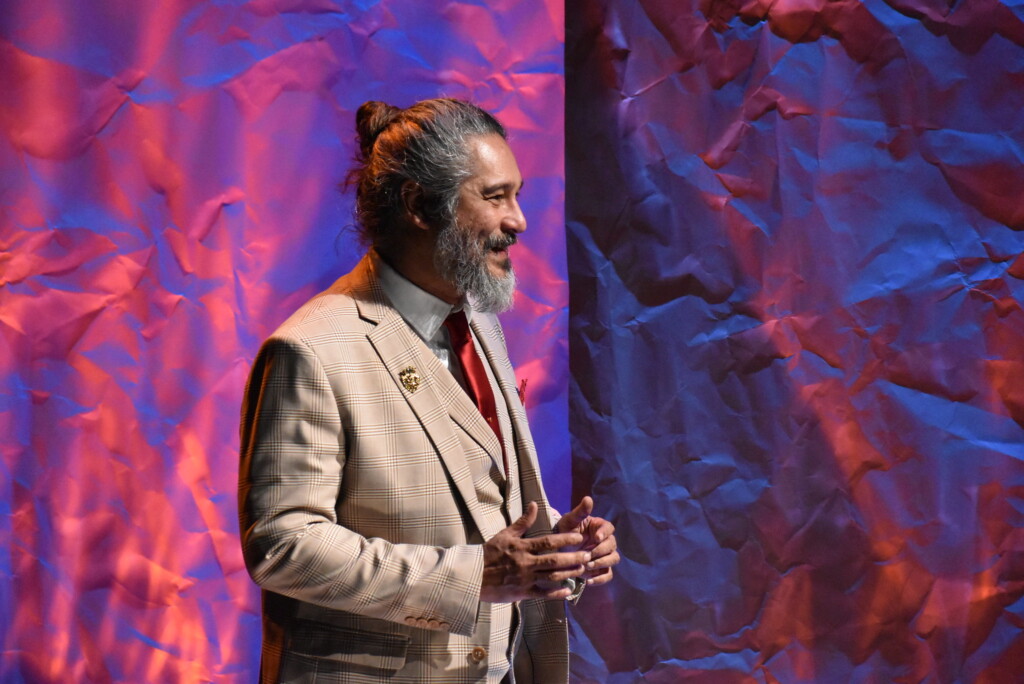The two actors in the fabulous Plan-B Theatre production of Melissa Leilani Larson’s Bitter Lemon persuade the audience to reconsider Shakespeare’s Macbeth, not just as a chronicle about the fatalistic machinations of power but also as the moral conflict about good and evil. This conflict is manifested in Larson’s character creations of Lady Helen Macduff and Finlay Macbeth.
Bitter Lemon is a prized chamber theater jewel. The set design (courtesy of Janice Chan, scenic designer and David Knoell, scenic builder and electrician) is emblematic of Plan-B Theatre’s deft and resourceful minimalistic rendering that clearly evokes the desired purgatorial setting of the play. This sensation is enhanced by Cheryl Ann Cluff’s ingenious sound design, created with manipulated and modulated audio of the two actors uttering “uhhhhhhhh” in varying pitches. As Helen Macduff, Yolanda Stange delivers a grand slam performance as the proto-feminist heroine that Larson has envisaged. As Finlay Macbeth, Bobby Cody smartly shades the subtle evolution from self-proclaimed hubris to a confessional sense of humility that he hopes might rescue him from damnation.

Photo Credit: Sharah Meservy.
As explained previously in The Utah Review’s preview of Bitter Lemon, Larson labeled her treatment of these Shakespearean characters as enemy fiction. To reiterate: more significant in the provenance of Bitter Lemon is that Larson wastes no time in explaining that she has never loved The Scottish Play, not due to its writing but to the fact that the main characters are wholly horrible individuals.
In Shakespeare’s original, it is hard to imagine a moment where Macbeth would have paused long enough to reconsider the evils he perpetrated or his unquenched thirst for brutal force that engulfed every character in the play with deep suffering. Sin is at the heart of Macbeth. In Bitter Lemon, Larson expands significantly upon the character of Helen Macduff, who denounces and repudiates in full voice any equivocating notions Macbeth would have contemplated in justifying his evil actions. Stange is at her best in expressing Helen’s profound skepticism that Finlay could ever find the grace and mercy for humility and atonement or aspire to the better side of human nature.

Yet, just before the middle of the play, Helen acknowledges that something must happen for them to be released from their purgatorial waiting room. “Clearly something needs to happen, something of which I’m a part,” she says to Finlay. “And now that you’re here, I wonder if there isn’t some kind of price to be paid before that something can happen.” Finlay responds, “A price?,” to which Helen says, “A trade, maybe a bargain. For us to move on to whatever happens next, something has to happen here. Something has to, as you say, shift.”
Neither of them has fully sorted it out and Finlay says, “We could just stay here.” Helen asks why would anyone want to stay forever “in between.” Finlay clarifies his response, “I didn’t say I wanted it. But if we don’t know what the price in question is, how can we possibly know it’s worth paying? If progression demands a price from both of us, perhaps it can only be determined by both of us. Together.”
Cody renders his character’s dilemma with sharpness and clarity. Helen’s unrelenting recounting of Finlay’s sins has pushed him to the cusp of how he might emancipate himself from damnation and envision for the first time the capacity to comprehend the starkest truths while in purgatory. No question that Helen has suffered deeply but she also glimpses for the first time signs of Finlay’s suffering, even as it cannot be disputed that he alone was responsible for his suffering.

Being redeemed from her scant appearance in the original Shakespearean script, Helen is cast in Bitter Lemon as the virtuous heroine who is confident that her own motives were pure in faith and nature, even while adjusting for pragmatic realities. But, Stange’s invigorating performance of Helen also tips its hat to the lesson associated with self-righteous indignation in The Prodigal Son parable. At the beginning of the play, Helen is shocked to see that of all the people she could have encountered in this purgatorial waiting room, it would have to be Finlay.
However, as the play progresses, Helen also witnesses the first expressions of Finlay’s self-awareness of his sins and a glint of humility in his accepting responsibility for his actions (again, skillfully rendered by Cody). As she ponders the probabilities of Finlay being rescued from spiritual damnation, Helen refers to the bitter taste of lemon mentioned in an early portion of the play: “I lied when I told you I couldn’t taste it. I have tasted it since my first moments here. But it’s been less noticeable lately. But since you came, I haven’t thought about it quite so much.”
The production run continues through April 28, in the Studio Theatre at the Rose Wagner Center for Performing Arts. Tickets are going quickly. For more information about perfomance dates and times as well as tickets, see the Plan-B Theatre website.
